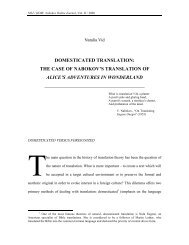Nabokov's Invitation to Plato's Beheading
Nabokov's Invitation to Plato's Beheading
Nabokov's Invitation to Plato's Beheading
- TAGS
- beheading
- etc.dal.ca
Create successful ePaper yourself
Turn your PDF publications into a flip-book with our unique Google optimized e-Paper software.
A. Moudrov. “Nabokov’s <strong>Invitation</strong> <strong>to</strong> Pla<strong>to</strong>’s <strong>Beheading</strong>”<br />
his other works, particularly Pale Fire, Lolita, The Eye, and the 1923 play Death. As if<br />
addressing the readers, Humbert tells Quilty at gunpoint: “I want you <strong>to</strong> concentrate. The<br />
hereafter for all we know may be an eternal state of excruciating insanity” (Lolita 297). It<br />
may well be.<br />
In what reminds us of Socrates’ attempts <strong>to</strong> dispel his reservations about<br />
immortality, the central conflict in <strong>Invitation</strong> <strong>to</strong> a <strong>Beheading</strong> appears <strong>to</strong> be not between<br />
Cincinnatus and the prison-world in which he is entrapped, but between him and his<br />
sense of reality. His doubts, not his jailers, seem <strong>to</strong> keep him in prison. His many flights<br />
of imagination, which are his way of escaping, are soon or later undercut by a doubt.<br />
Thus in the first scene of the novel, in which Cincinnatus learns about his death sentence,<br />
he is compared <strong>to</strong> “a man who has dreamt that he is walking on water,” which would<br />
create an optimistic image if it was not undercut by “a sudden doubt: but is it possible?”<br />
(11). Cincinnatus asks himself the same question throughout the novel, and the answer is<br />
not always affirmative. Even when he seems convinced, his belief still lacks a convincing<br />
ring. “It exists, my dream world,” Cincinnatus says in his soliloquy, “it must exist,” he<br />
repeats as if in doubt. And like Socrates before him, he feels that he has <strong>to</strong> prove its<br />
existence <strong>to</strong> himself: “surely there must be an original of the clumsy copy,” he says in<br />
what actually sounds an echo of Socrates’ famous argument (93). 6 They are,<br />
consequently, <strong>to</strong>rn between their optimism about afterlife and a realization that they are<br />
mortal. This explains why there appear <strong>to</strong> be two Cincinnatus’, one confident and<br />
rebellious while the other complacent and fearful (15, 25, 29, 40, 69, and 222-3). This<br />
6 The idea that this world is a copy of another reverberates throughout Pla<strong>to</strong>’s works, and can be<br />
exemplified with Timaeus’ words: “the world has been framed in the likeness of that which is apprehended<br />
by reason and mind and is unchangeable, and must therefore of necessity, if this is admitted, be a copy of<br />
something” (Timaeus 27c-29d).
















